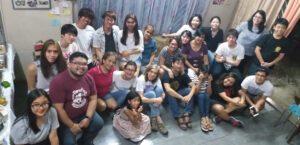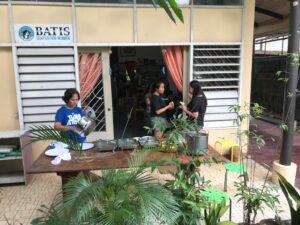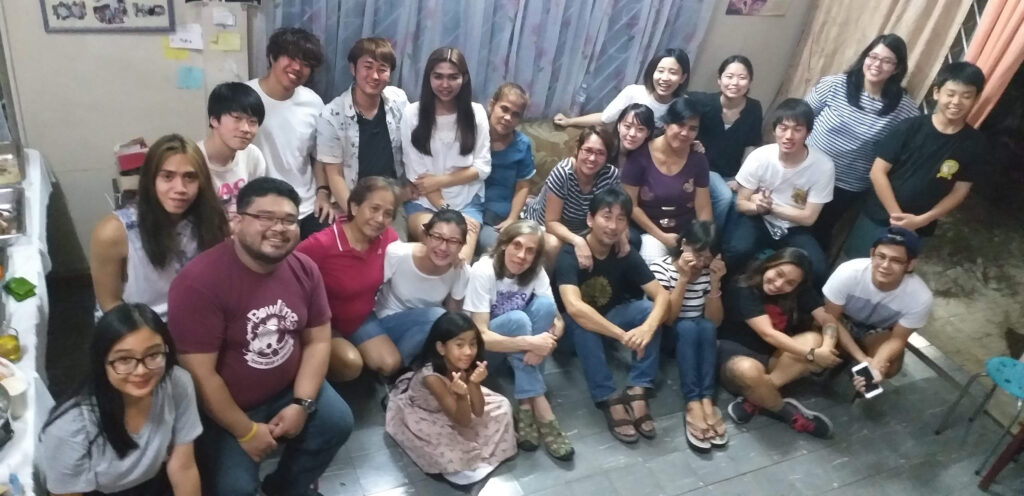The New Call for Accompaniment
Martha Mensendiek serves with Doshisha University, Kyoto, Japan.
What a year this has been. So many people all over the world have suffered lost lives, or loved ones lost jobs and stability. Many people are still anxious about the future.
In last year’s letter, I wrote about my (then) upcoming trip to the Philippines with students and about my integral connection with the people of that country. Well, that trip never happened – canceled because of the growing threat of the pandemic. My annual social work study tour with students to Hawaii in September of course also had to be canceled. So much of my teaching involves fieldwork or “going places” and “meeting people” that this pandemic has been a challenge to learn new ways to keep the connections alive through various tools like Zoom that now many of us are depending on.
The Bazaar Café, (our church’s coffee house ministry), continues to be open for lunch and coffee, with seating outside, as well as indoors, with various precautions implemented. However, we are not able to have large groups or gatherings of people for various functions, which is, of course, true for churches and other organizations throughout the world.

The other day, a small group of us met at the Bazaar Café for a debriefing session of a three-year HIV research project. We were part of an HIV research grant and we looked at how the Bazaar Café has supported the vulnerable, especially focusing on HIV-positive persons. We interviewed former staff, clients, and volunteers, some of whom are HIV-positive individuals in order to record the history of our Café and then through analyzing the findings, to identify some characteristics of our support and our particular role in assisting vulnerable persons.
One of our conclusions is that our support can be identified as “Banso-gata” (the Japanese word literally means “running alongside”) or translates into English as “accompaniment.” Our style of assistance is to accept persons where they are and to walk/run alongside them toward healing/wholeness. We connect them to formal systems of support if needed, but do not judge them if they do not follow through, or if they have a relapse of any sort. Our purpose is to prevent the social isolation of those who are often disconnected from family and from society at large. We want to continue to be a connection for them, while also respecting their autonomy.
This “Banso-gata” support has been made famous in Japan through a pastor in Kyushu Japan, who has been active in reaching out to and supporting homeless persons. Rev. Tomoshi Okuda is the director of a non-profit organization supporting the homeless and is well known for his advocacy work including lobbying for increased government assistance for society’s most vulnerable people. He talks about how poverty is not just economic deprivation but a problem of social isolation. So “Banso-gata” support involves continuing to connect with the isolated persons and connect them to the community and to the particular support they need. At the same time, it is important to respect the autonomy of the person. It goes beyond standard distinctions of “those who help” and “those who are being helped.”

We invited Rev. Okada and his managing director, also a pastor, to join our debriefing session to give us feedback on our findings. All those in attendance found Rev. Okada to be quite a charismatic and inspiring speaker. He pointed out the theological context of “accompaniment” as being the core of the Christian faith – that is, “Immanuel” – God with us. He emphasized that God accepts us as we are, and it is our very “existence” that is accepted. That is the base of his model of “Banso-gata” support for homeless and impoverished persons, as it is for the Bazaar Café.
It was not a surprise that his comments were very uplifting and gave us positive reinforcement as well as ideas for moving forward. This experience of sharing our story together with Rev. Okada gave us the opportunity to reflect on what we have been doing at the Bazaar Café and to reaffirm our commitment to continue accompanying those who are socially isolated.
Although it may seem that Covid-19 has not hit Japan as hard as other countries, the consequences of the pandemic are becoming more apparent here as well. As is true in many countries, poverty, cases of domestic violence, and suicide (especially among women) are on the rise. Foreign workers are also among the most vulnerable, being the first to be laid off, thus not being able to renew their visas, being cut off from health insurance, etc. Those with addictions find it hard to keep sober in the midst of anxiety. And so, our work of being a connection for people and accompanying people through this hard time is needed more than ever. Thank you for your prayers and support of our continued ministry of accompaniment in Japan.
Martha Mensendiek serves with Doshisha University, Kyoto, Japan. Her appointment is made possible by your gifts to Disciples Mission Fund, Our Church’s Wider Mission, and your special gifts.

